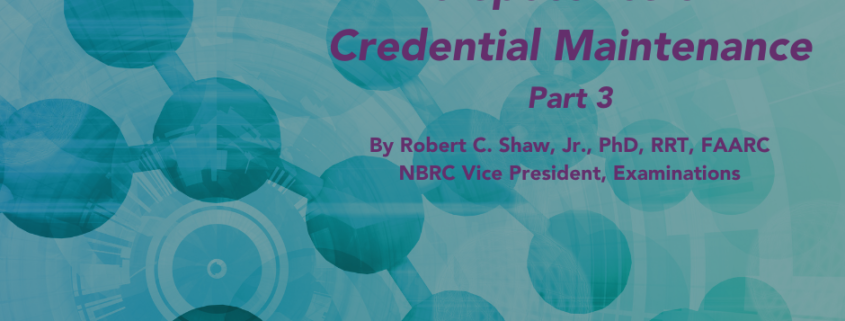Perspectives on Credential Maintenance: Part 3
by NBRC Vice President of Examinations, Robert C. Shaw, Jr., PhD, RRT, FAARC
Parts 1 and 2 of the ‘Perspectives on Credential Maintenance’ series describe expected points-of-view from the three groups of credentialed practitioners who chose to participate in assessments for the Credential Maintenance Program (CMP). This article, Part 3, provides feedback submitted by assessment participants that all practitioners may find useful when completing assessments.
There is a time limit.
The comments below show that these individuals waited too long to submit responses to assessments.
- I attempted to do this exam last minute. Not ideal I’m aware. The exam wasn’t available to me and it appears that I have taken the exam and scored 0/10.
- Test closes today, except it has already closed.
Practitioners may access an assessment until midnight (Central Time) on the last day of the quarter ending in March, June, September, and December. When assessments aren’t completed by the deadline, practitioners miss the opportunity to potentially reduce the number of CE’s required by the NBRC.
Your internet connection is important.
Being able to take assessments when, where, and how you choose is a tremendous benefit designed into the system. The comment below describes why it is important to have a solid internet connection when taking assessments.
- My wifi dropped out during the CMP quiz while waiting on a question to load. Once reconnected, I was automatically sent on to the following question without ever having seen question #9 which was automatically marked wrong.
There is no way to distinguish between intentional and accidental internet disconnections, or time expirations. Ensure a stable connection by restarting your device before you start an assessment or using a wired connection instead of a wireless connection.
Built in security.
The assessment system is intended to engage each practitioner with the content without them taking shortcuts. If one person shares assessments so others can submit responses without thinking about the content, then the learning that is expected to occur is bypassed, which could be detrimental to patients. The feedback below confirms the monitoring system that is built into the system works as intended.
- I was taking the assessment questions and I touched the screen one second too long and it highlighted text and warned me about cheating. These are offered on smart phones and that sometimes happens.
- My daughter crawled on my lap and touched the screen of my phone. A red box message popped up saying I was cheating on the quiz/test. I’m not sure why that popped up.
The assessment system tracks the number of times an attempt to copy text or screenshots occur. One event is not a problem, but too many events will get our attention, which will prompt follow up communication.
Assessment attempts cannot be reset.
We anticipated the new system could be challenging to use. Practitioners should be mindful that assessments cannot be reset and pay careful attention to having them open on mobile devices.
- My toddler was playing with my phone. I never actually took the 1st Can this be reset?
If no responses have been submitted, individuals may complete the assessment before it expires. However, the system cannot distinguish between accidental and legitimate responses.
Why assessments exist.
The primary goal in using assessments is to strengthen the relationship between competencies of credential holders and expectations linked to those credentials. Quarterly assessments are a component of the CE option to maintain credentials through the promotion of learning. A practitioner with a credential could do any of the things described in the content outline based on the results of the job analysis study. Each assessment is designed to focus on content that changes most rapidly and puts the public at highest risk. An additional goal of the assessments is to prepare a practitioner when they suddenly experience a new scope of practice after starting a new job.
- Many of the questions are related to things I am unable to do. They are not used in the setting where I work.
It may feel unfair to be asked about practices not all practitioners do, but a patient receiving respiratory care will think differently.
Assessments aren’t so bad after all.
Among feedback saying assessment questions were confusing, vague, split hairs, impractical, or had multiple acceptable answers, some practitioners shared these insights.
- Just wanted to say thank you, our profession needs this badly. This has awesome potential, please keep this going. I did horrible for my first time but I look forward to coming back and learning more.
- Wide variety of questions. I like it!
- This was kind of fun and it helps to try to remember things. Maybe there could be a sound when you get a correct answer.
Right now, we focus on the basics of putting viable assessments in front of practitioners so they can receive meaningful feedback that we hope prompts learning. In the future, game-like experiences could be integrated to increase the positive reinforcement.




